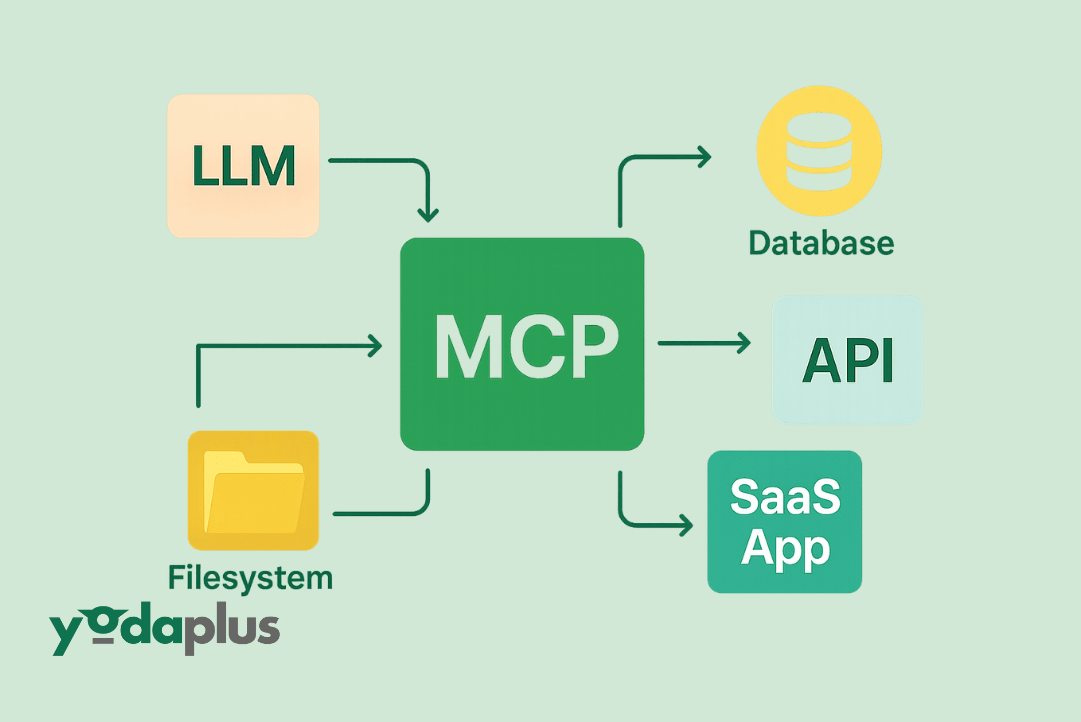
Building with MCP: A Developer’s Primer for Context-Aware AI Workflows
April 29, 2025 By Yodaplus
Introduction
The Model Context Protocol (MCP) is redefining how developers build context-aware AI workflows. Think of MCP as the “universal connector” for agentic systems, standardizing how large language models (LLMs) and autonomous agents interact with external tools, resources, and data streams. Just like USB-C standardized hardware connections, MCP is set to become the go-to protocol for modular, scalable, and intelligent AI development.
At Yodaplus, we are deeply committed to advancing Artificial Intelligence solutions, helping businesses adopt smarter, more adaptable systems through context-aware agent workflows.
In this blog, we offer developers a practical guide: how to model workflows using MCP, open-source resources to get started, and tips on thinking modularly when building for modern AI ecosystems.
Why MCP Matters for Developers
In traditional AI workflows, connecting models to APIs, databases, or external systems often required custom integrations. MCP changes that by offering:
- A standardized context format across applications
- Secure, scalable communication between models and resources
- Modular designs, making it easier to plug and play with tools
It enables more agentic AI capabilities by helping AI agents not just respond, but reason, plan, and take meaningful action.
How to Model Workflows Using MCP
At the heart of MCP lies the context object. It defines:
- Resources: Read-only data stores (e.g., databases, document archives)
- Tools: APIs or actions the agent can invoke (e.g., payment gateways, inventory updates)
- Prompts: Predefined text interactions to assist LLMs
A typical MCP workflow might look like this:

- Connect the MCP client (inside your chatbot, assistant, or platform) to one or more MCP servers.
- Discover available resources, tools, and prompts.
- Contextualize: Pull relevant resource data into the agent’s working memory.
- Act: Invoke tools when decision-making or task execution is required.
- Update: Stream results or changes back to users in real time.
Example: Basic YAML Config for an MCP Resource
resource:
id: customer_database
type: sql
endpoint: https://your-database-endpoint
permissions:
– read
filters:
active_customers:
condition: status == ‘active’
This configuration makes customer data available securely without building a direct API integration from scratch.
MCP Open-Source Tools and Libraries
Developers can start building today using:
- MCP Python SDK: Ideal for integrating MCP into Python-based AI applications.
- Anthropic MCP Server Examples: Templates to set up local or cloud-based MCP servers.
- Google ADK (Agent Developer Kit) and OpenAI Agent SDK: Both natively support MCP, enabling smoother multi-agent interactions.
Soon, even platforms like Crew AI and LangGraph will enhance their MCP integrations to enable seamless context sharing across agents.
MCP vs. Traditional Custom Integrations
| Feature | Traditional APIs | MCP-Enabled Workflows |
| Setup | Manual integration per system | Standardized client-server protocol |
| Scalability | Complex to extend | Plug-and-play modularity |
| Maintenance | Heavy dependency management | Easier resource and tool updates |
| Developer Experience | Siloed development | Unified access to resources and tools |
Think Modular: Building MCP Workflows the Right Way
When developing with MCP:
- Abstract resource definitions: Treat databases, CRMs, and APIs as modular resources.
- Use tool-specific contexts: Each action or API call should have clear permissions and parameters.
- Plan for dynamic updates: Design systems where tools and resources can be discovered and updated without downtime.
- Embrace asynchronous workflows: Use SSE (Server-Sent Events) for real-time event handling, keeping your agents reactive and efficient.
This modularity is essential to scale AI applications beyond static pipelines into fully autonomous, dynamic systems.
Final Thoughts
MCP offers developers a powerful foundation to build context-aware AI workflows that are secure, scalable, and intelligent. Whether you are connecting a FinTech system, a document digitization platform, or an inventory management solution, modular, context-rich architecture is the future.
At Yodaplus, we are already applying these standards across financial services, supply chain technology, retail solutions —designing systems that think, adapt, and collaborate intelligently.
If you are building agent-driven systems and want to future-proof your architecture, adopting MCP is one of the smartest steps you can take.